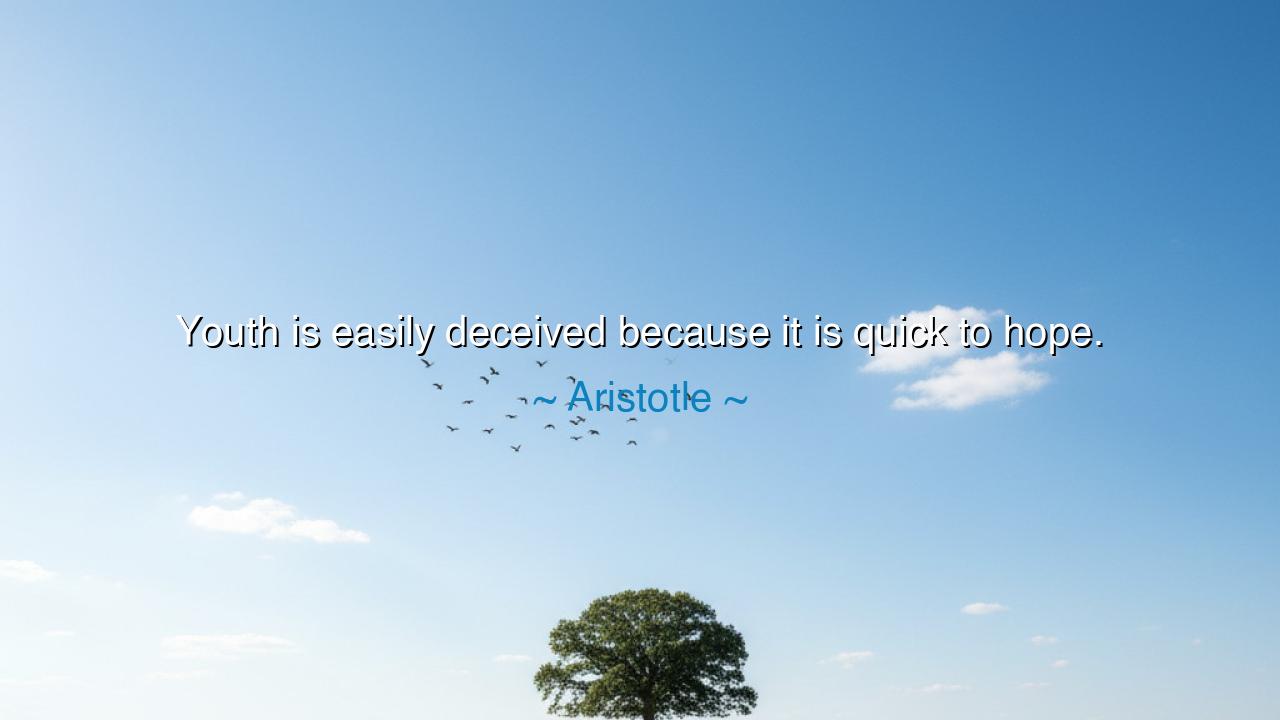
Youth is easily deceived because it is quick to hope.






The words of Aristotle—“Youth is easily deceived because it is quick to hope”—are both tender and cautionary, born from the heart of a philosopher who saw the world not only as it is, but as it might become. In this brief saying, he captures the bright fire and peril of the young spirit. Youth, he tells us, lives close to the dawn, when all things seem possible and every horizon glows with promise. Yet it is this very light that can blind. The young, in their eagerness to believe, often mistake hope for truth, and desire for destiny. Aristotle’s words are not a rebuke, but a mirror held up to the vitality and vulnerability of the human beginning.
To understand his wisdom, we must remember that Aristotle was not speaking from cynicism but from compassion. He knew that hope is the breath of youth—the force that drives the heart to dream, to attempt, to defy. But he also knew that when hope is untempered by experience, it becomes a deceptive flame. It leads one to trust too quickly, to love too easily, to leap before seeing where one will land. The young believe the world to be as pure as their own intentions, not yet seeing how shadow often walks beside light. Thus, hope, though divine, becomes the very snare through which deception enters.
The philosopher’s insight endures because it is written in the pattern of human life itself. In the first chapters of every person’s story, the heart is larger than the mind, and passion runs swifter than wisdom. Consider Alexander the Great, who was once Aristotle’s own student. Burning with youthful vision, Alexander set out to conquer the world before he had learned its measure. His hope was vast, his belief in his own destiny unshakable—and though he achieved immortal fame, he also burned out before his years had ripened. His empire crumbled soon after his death, for his hope had outrun the patience that builds lasting things. Thus, even in greatness, we see the truth of Aristotle’s words: hope without balance deceives.
Yet we must not mistake this teaching as a call to abandon hope. To hope is to be alive; to dream is to be divine. Without hope, youth would wither before it blooms, and civilization itself would cease to grow. What Aristotle warns against is not the presence of hope, but its impulsiveness—the kind of hope that refuses to see the cost, that believes all promises and denies all peril. The wise man learns, as he ages, that hope must walk hand in hand with discernment. To hope wisely is to see both the light of the goal and the shadow of the path.
In every generation, the world renews itself through the hopeful heart of youth. It is youth that rises against injustice, that invents, that dares. But because youth is quick to hope, it is also quick to trust false prophets—those who promise glory without labor, joy without sacrifice, or change without endurance. History is filled with such examples. The young soldiers who marched into the Great War believed they would return home in triumph by Christmas; the students of revolutions believed their new worlds would be free from corruption. And yet, each learned in sorrow that hope without wisdom can be as dangerous as despair.
Still, hope remains sacred. For even when it deceives, it teaches. Through disappointment, the young learn discernment; through betrayal, they learn depth. The pain of lost hope is not the end of youth—it is its transformation into maturity. The flower must open fully before it can release its seed. So too must the soul of youth open itself to hope, even at the risk of deception, so that it may later bear the fruit of understanding.
Let this, then, be the teaching: do not surrender hope, but temper it. Let your heart be eager, but your mind awake. Seek beauty, but test its truth. Dream grandly, but walk with care. The wise do not extinguish the fire of youth; they tend it, shaping it into a steady flame that warms rather than burns. Hope is a gift, but it must be guided by patience, humility, and learning.
For in the end, Aristotle reminds us of a simple and eternal law: it is better to hope and be deceived than to never hope at all—for from hope, even wounded hope, comes growth. Yet the greatest strength lies in learning to hope with open eyes—to see the world as it is, and still choose to believe in what it might become. Thus shall the young heart mature without hardening, and hope, once reckless, shall become the wisdom of courage itself.






AAdministratorAdministrator
Welcome, honored guests. Please leave a comment, we will respond soon